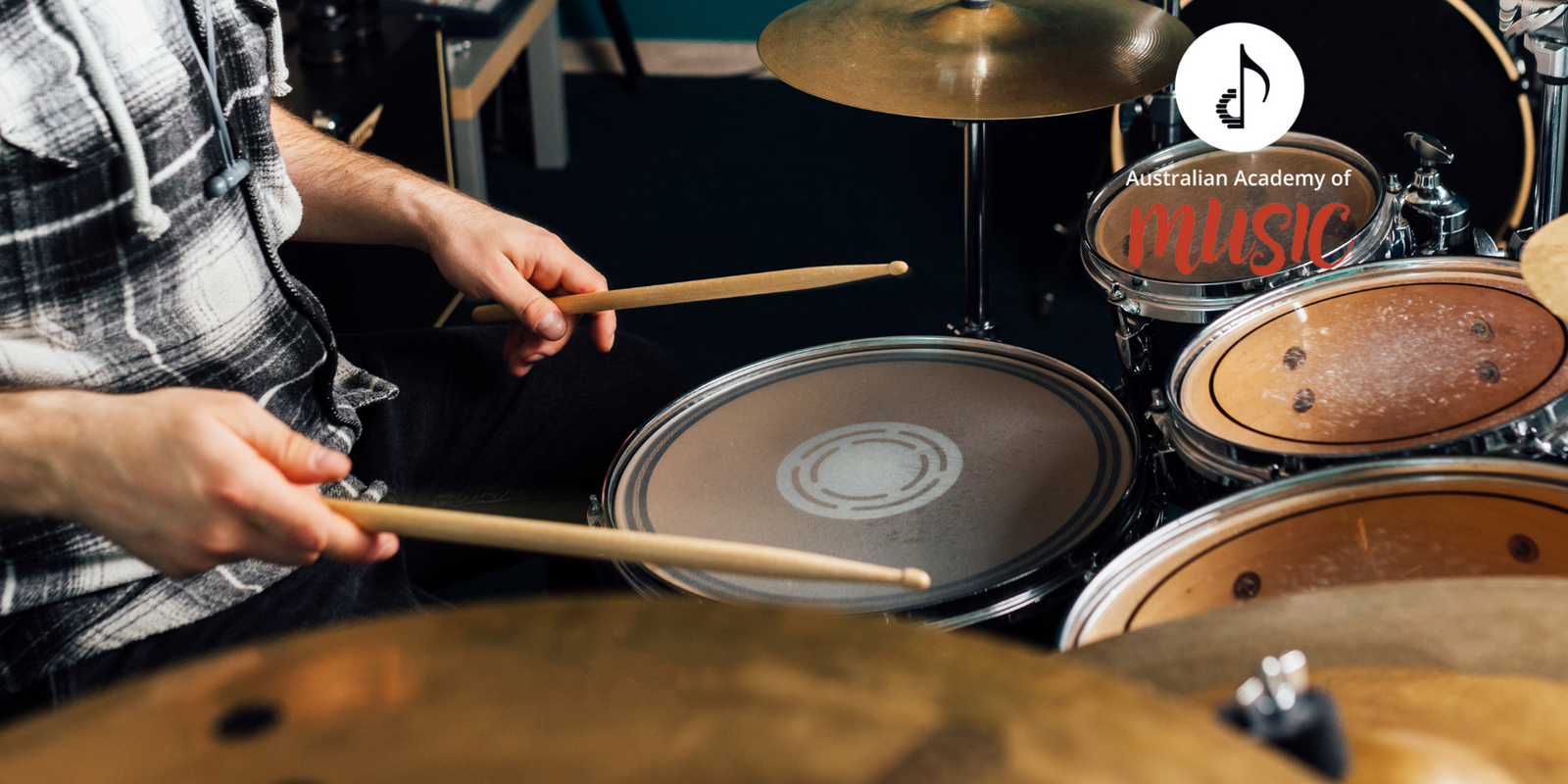The drums are the heartbeat of any band, providing the rhythm, energy, and drive that make music come alive. From rock to jazz to classical, drums are at the core of most musical genres. If you love rhythm, enjoy physicality, and want to be a crucial part of a band, learning to play the drums could be the perfect choice for you.
Why Learn the Drums?
-
Rhythm foundation: Drums provide the backbone of any piece of music, keeping time and setting the pace for the band
-
Energetic and expressive: Drumming allows you to express yourself physically and emotionally through rhythm
-
Essential in every genre: Whether you're playing rock, pop, jazz, or funk, drums are present in almost every genre of music
-
Great for teamwork: Drummers are often at the centre of the band’s dynamics, supporting and coordinating with other musicians
If you love making noise and being at the center of the action, drumming is the way to go.
Lessons at the Australian Academy of Music
We offer individual drum lessons and workshops for all experience levels:
-
Beginner lessons: Learn basic rhythms, drumming techniques, and simple beats
-
Intermediate lessons: Progress to more complex drumming patterns, fills, and rudiments
-
Homeschool program: Drumming is ideal for group lessons, where you can play with others and learn to perform in an ensemble setting
Our experienced instructors will guide you in mastering the drums, helping you develop your rhythm, coordination, and musicality.
Location:
26/302 South Pine Road, Brendale QLD 4500
Enquire about a drum lesson today
Buying Your First Drum Kit
When purchasing your first drum kit, it’s important to consider the following:
Types of drum kits:
-
Acoustic drum kits: These kits produce a loud, rich sound and are perfect for live performances and studio recordings
-
Electronic drum kits: These kits offer quiet practice with the ability to plug into headphones or an amp, making them ideal for home practice
-
Shell material: Most drums are made from wood, but the type of wood (e.g., maple, birch, or poplar) affects the sound quality
-
Size of the kit: A standard kit includes a bass drum, snare drum, two rack toms, one floor tom, hi-hats, and cymbals, but beginner kits may come with fewer pieces
When buying your drum kit, also consider getting drumsticks, a drum throne (seat), and a metronome for practice.
Must-Have Drum Accessories
To make the most of your drumming experience, here are some accessories you'll need:
-
Drumsticks: Drumsticks come in different sizes and materials; heavier sticks are used for rock or louder music, while lighter sticks are used for jazz or softer sounds
-
Practice pad: A quiet way to practice rudiments and sticking techniques without needing a full kit
-
Drum throne: A comfortable, adjustable seat designed specifically for drummers
-
Cymbals: Drummers typically use hi-hats, a ride cymbal, and crash cymbals, and you may need to buy these separately
-
Drum mat: Keeps your drum kit from sliding around on the floor while you play
-
Drumhead cleaner: Helps maintain your drum heads and keep them sounding bright
These accessories will help improve your playing and maintain your kit.
Cases
Protecting your drums is essential, especially if you're transporting them:
-
Soft cases: These are lightweight and offer basic protection for drum shells and cymbals
-
Hard cases: If you're traveling with your drums or need extra protection, hard cases offer superior durability and safety
-
Cymbal bags: Special bags for transporting cymbals without damage
Investing in a good case will ensure your drums last longer and stay in good condition.
Performance & Band Gear
Once you're ready to perform, here’s some additional equipment you might need:
-
Drum amplifier: For electronic kits, you’ll need a bass amp or drum amplifier to amplify the sound
-
Metronome: Essential for keeping time and improving your rhythm
-
Music stand: If you're reading sheet music, a stand will help you keep it organized during rehearsals or performances
These items will help you feel ready to play live and perform with others.
Drums Maintenance Basics
Proper maintenance of your drums is essential to keep them sounding great:
-
Replace drumheads: Over time, drumheads can wear out or get damaged, so replacing them is key to maintaining sound quality
-
Clean your drums: Wipe down your drum shells and cymbals regularly to remove dust and grime
-
Check drum hardware: Tighten any loose drum hardware, including tension rods and cymbal stands
-
Lubricate pedals: Regularly lubricate your bass drum pedal and hi-hat stand for smooth action
Routine maintenance will keep your drums in top condition and ensure they continue sounding great.
Servicing and Repairs
If your drums need servicing or repairs, we offer professional drum care:
-
Drumhead replacement: Replace worn or broken drumheads to keep your drums sounding fresh
-
Hardware repairs: If your stands, pedals, or mounts are malfunctioning, we can fix them
-
Cymbal cracks: If you have cracks or damage on your cymbals, we can assess and repair them where possible
Regular servicing will help extend the life of your drum kit and keep it performing at its best.
Easy Songs to Start With
Here are a few easy drum songs to get you started:
-
“We Will Rock You” – Queen
-
“Billie Jean” – Michael Jackson
-
“Back in Black” – AC/DC
-
“Come Together” – The Beatles
-
“Another One Bites the Dust” – Queen
These songs are great for practicing basic drumming patterns and developing your sense of timing.
AMEB Drums Exams
AMEB (Australian Music Examination Board) exams offer a structured way to assess your progress on the drums.
First exam (Preliminary or Grade 1):
-
Perform two pieces from the AMEB drum repertoire
-
Technical exercises: Learn rudiments, basic drumming patterns, and basic coordination
-
Sight reading and aural tests: These tests assess your ability to read drum notation and identify musical patterns
AMEB exams are a great way to challenge yourself and track your development as a drummer.
Ready to Start?
Drumming is a fun, dynamic, and incredibly rewarding activity. Whether you’re interested in performing in a band or just playing for fun, the drums will provide you with endless opportunities for creativity and expression.
Visit us at:
26/302 South Pine Road, Brendale QLD 4500
Enquire about a drum lesson today




